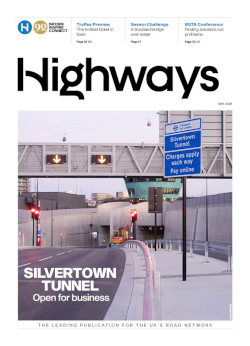TrafficInfraTech is India's premier trade exhibition and conference for the traffic, ITS, parking and related sectors, reports Smart Highways columnist Mark Pleydell, from the event.
It is held annually and the venue moves around the country, having been in Delhi for the last two years. The event is recognised, supported by the country's Ministry for Road Transport and Highways.
For those familiar with Traffex or SIB in the UK this is similar sized event, and the exhibitors present a similar portfolio of solutions, albeit focussed on the particular road conditions and traffic levels in India.
The exhibitors are largely domestic businesses, often represnting nanufacturers in Europe, North Africa Australia and China. A number of names (and faces) familiar to UK practitioners are also present.
Indian highways are largely privately owned under DBFO style contracts. Urban traffic is managed by the traffic police, with other agencies supporting roads, public transport, and other facets of the network. TrafficInfraTech attendees are typically senior decision makers from these organisations, and in this fast-growing market there is a thirst for information and insight.
The largest names in the Indian traffic sector are state funded manufacturers including Kelton (Kerala Electronics), BEL (Bharat Electronic Industries) and CDAC, (India's TRL), CMS, DITMS (Delhi). There are also innovative players such as Efftronics (solar powered cable-less traffic signals) ITS Planners and Engineers (consultancy, software and contract R&D) and Infrovate (tolling, RFID, security and border control).
The exhibition is accompanied by a conference programme addressing topics across the fields of highways and tolling, urban traffiic and public transport.
Amongst the presenters and delegates there is a high level of awareness that with increasing prosperity and the rate of car ownership increasing 8x faster than the rate of road building, and people moving away from public transport, 150,000 road deaths (1 in every 8000 people) annually and one of the planet's highest congestion indices and despite deploying bus rapid transit systems, investing massively in highways and in smart cities, that things may well get worse before they get better. India needs some fundamental changes over the long term to move from recognising the problem to achieving improvement, and if that sounds harsh the data and observations are all quotes from presentations and conference discussions.
Those interested in learning more should look at the TrafficInfraTech website, http://www.trafficinfratechexpo.com





